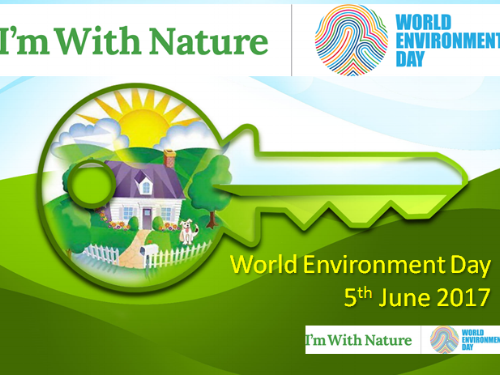Canada is all in.
That is what our Prime Minister tweeted today to celebrate World Environment Day, the first Monday during Environment Week.
What does it mean for Canada to be ‘all in’, you ask?
Well, for World Environment Day the Government of Canada is focusing on 3 major strategies we've committed to that will help protect our planet:
• In 2010 we agreed to Conservation targets — to protect at least 17 percent of the country’s terrestrial areas and inland waters by 2020.
• In 2015 The Paris Agreement was reached — to undertake ambitious efforts to combat climate change and adapt to its effects.
• In 2016 The Pan-Canadian Framework on Clean Growth and Climate Change was developed — to meet our emissions-reduction target and grow the economy.
As we achieve these commitments there will be tangible short term and long term benefits for Canadians and the Earth. Cleaner air, water and soil is good for our health too and saves us money on health care bills, infrastructure like water treatment plants or landfills and lost productivity.
Show you are #WithNature by sharing your nature moment during World Environment Day!
This year’s theme for World Environment Day is Connecting People to Nature, something we, at the OWC, try to do each and every day.
So today we ask: are you all in?
Chances are, there’s something more each and every one of us can do to lessen our personal environmental footprint.
Likely you already recycle, conserve water and donate used clothing, but have you ever tried growing some of your own food or planting bee friendly flowers in your yard?
This Environment Week (June 4-11) is your opportunity to take your first steps towards lessening the impact of your very own backyard. Learn more about this week's events here.
Take your first step towards growing some of your own food by taking in this presentation tomorrow!
If you are an urbanite, one of your biggest impacts on the watershed could be hiding in your backyard.
Did you know storm water runoff from our backyards, parking lots and streets is not treated? It goes directly into the nearest river or lake, eventually making its way downstream to our neighbouring towns and farms.
Storm water is polluted with fertilizers, pesticides, dog poop, garbage and worse, so it is vital that we all do our part to ensure only rainwater is going down our storm drains.
You can help by: 1. using natural fertilizers like compost or aged manure instead of chemicals that runoff more easily, 2. limiting pesticide use and trying natural vinegar based formulas instead and 3. picking up after your pets.
Teach your kids about these issues by signing up for the Yellow Fish Road program or Adopt a StormDrain program.
There are so many things we can all do for the watershed. But the most important thing is just to start by doing one thing, and then another.
One of the most important things you can do is to talk to your friends, neighbours, family and colleagues about these issues and encourage them to get involved in groups like the OWC. Encourage them to follow us on Twitter, Facebook, LinkedIn or YouTube as a place to start.
Bring friends to our upcoming Annual General Meeting where we will be showcasing not only our accomplishments but also our partners in the community. Details here.
The Taber Irrigation District, MD of Willow Creek, St. Mary River Irrigation District and Timber Ridge Ranch are all doing impressive restoration projects and will be sharing their stories at the event as part of the Southern Alberta Water Charter project showcase.
Join in on the fun! We will be playing team jeopardy, sharing restoration stories and celebrating our accomplishments!
Pledge to tackle just one of these ideas and then you too can sign the Southern Alberta Water Charter and show the watershed you care. World Environment Day would be the perfect day to sign up!
Whether you choose to donate, volunteer or make a change in your life, know that your contribution means the world to us. It shows us that our community cares about our watershed and wants our crucial work to continue. Your support inspires us to keep going.
Thank you for all the little things you do each day to lessen your impact. Those small acts make a big difference to the health of the watershed and inspire others to follow your example.
Together we prove that Canada is all in.
“Sometimes the bravest and most important thing you can do is just show up”








